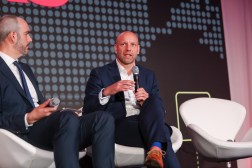Federal IT isn’t keeping up with new technology – Brocade CEO

Brocade CEO Lloyd Carney. (FedScoop)
Brocade CEO Lloyd Carney warned that the government’s legacy IT systems, once the pride of America’s IT leadership, need to be modernized to function more effectively and respond to cyber attacks from foreign countries, many of which are using newer generations of network technology.
He said that countries like China, which was blamed for the recent hack of Office of Personnel Management data, have co-opted infrastructure developed here and out-maneuvered our own innovations — while the U.S. is left behind, he said during Brocade’s Federal Forum Wednesday.
“You can no longer put a firewall around the infrastructure — they’re inside the firewall,” Carney said, referring to the Chinese hackers. “And they’re using modern tools against us, so it’s imperative for us that we modernize our infrastructure.”
Carney emphasized the need for a more open, flexible stack over smooth interoperability.
“Look at the flexibility on the platform you use every day,” he advised. “It’s about having a flexible stack, which is your network layer, and within that, having solutions that are interchangeable and open so it drives down cost and enables you to scale.”
Carney said the government has to spend more on new solutions to catch up with countries abroad. He noted that the IT systems used by federal agencies in many cases were built 20 years ago, before the advent of cloud and mobile computing and the need for integrated security systems were ever envisioned.
The Chinese and others, he said, “aren’t spending 85 percent of every new dollar on old stuff.” Of the more than $80 billion the federal government spends on IT annually, between 80 percent and 85 percent goes to maintaining and operating existing IT systems, according to federal figures.
In simple terms, “stop buying old stuff and start buying modern switches,” he said. “That’s the first step along the journey.”
And if there’s a dominant single vendor that continues to receive the most business, “you have higher cost, no innovation,” he said. “So breaking the status quo means we have to change that paragon.” He argued that using an openly developed, versus proprietary, system “will enable you to develop a defense against an asymmetrical network.”
Later, in a sit-down interview with FedScoop, Carney, who is on the board of Visa, said government and civilians have a lot to learn from the private sector.
Finance companies are deploying machine-learning tools that measure what is normal behavior and then run analysis to detect anything fishy.
“They work hard at verifying users who come into their enterprise, and limiting access to those customers,” he said. “They also make sure they encrypt aggressively.”
An important point, he said, is that banks have extra firewall protections — because they assume the threat is already there.
“They spend time ferreting out the threat already within” and getting rid of the hazard, he said.
Additional reporting from the Federal Forum 2015
Government needs agile networks, federal CIOs say – At Brocade’s Federal Forum, produced by FedScoop, IT leaders emphasized the need for flexible computing networks as the U.S. faces a mounting cyber threats.
How the ‘New IP’ can help federal agencies –Brocade said federal agencies that use software-defined networks will get the fast and flexible systems that they have wanted for years.
Government needs agile networks, federal CIOs say – At Brocade’s Federal Forum, IT leaders emphasized the need for flexible computing networks as the U.S. faces a mounting cyber threats.
CIOs turn focus to business outcomes and mission – As they update their IT infrastructure, federal CIOs are beginning to focus on how technology can impact business and mission.
Tony Scott’s plan for restoring confidence in federal cybersecurity – The new U.S. chief information officer outlined his strategy for improving the government’s cybersecurity posture — faster, newer, better.
Agencies using hybrid clouds need orchestration tools – As agencies expand their IT into multiple clouds, the need for a single, open source orchestration platform is becoming more crucial, a cloud expert argues.
Federal, industry leaders recognized for ‘Breaking the Status Quo’ – At Brocade’s 2015 Federal Forum, four federal and industry leaders were recognized for their innovative work in government information technology.






